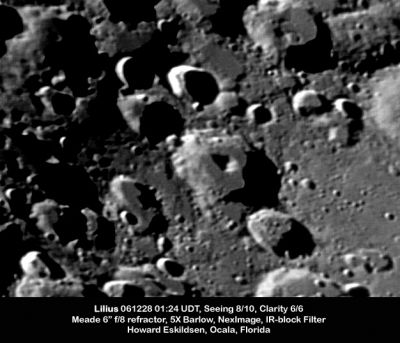Lilius
Contents
Lilius and Lilius Alpha (pronounced central peak)
|
Lat: 54.6°S, Long: 6.09°E, Diam: 61.18 km, Depth: 3.68 km, [/R%C3%BCkl%2073 Rükl 73] |
Table of Contents
[#Lilius and Lilius Alpha (pronounced central peak) Lilius and Lilius Alpha (pronounced central peak)]
[#Lilius and Lilius Alpha (pronounced central peak)-Images Images]
[#Lilius and Lilius Alpha (pronounced central peak)-Maps Maps]
[#Lilius and Lilius Alpha (pronounced central peak)-Description Description]
[#Lilius and Lilius Alpha (pronounced central peak)-Description-Elger Elger]
[#Lilius and Lilius Alpha (pronounced central peak)-Description-Wikipedia Wikipedia]
[#Lilius and Lilius Alpha (pronounced central peak)-Additional Information Additional Information]
[#Lilius and Lilius Alpha (pronounced central peak)-Nomenclature Nomenclature]
[#Lilius and Lilius Alpha (pronounced central peak)-LPOD Articles LPOD Articles]
[#Lilius and Lilius Alpha (pronounced central peak)-Bibliography Bibliography]

Howard Eskildsen
Lilius is the crater at center of Howard Eskildsen's telescopic photograph.
Note its pronounced central peak, which was once called Lilius Alpha.
Images
LPOD Photo Gallery Lunar Orbiter Images Apollo Images
Maps
([/LAC%20zone LAC zone] 126B3) LAC map Geologic map
Description
Elger
([/IAU%20Directions IAU Directions]) LILIUS.--An irregular ring-plain, 39 miles in diameter, with a rampart on the W. nearly 10,000 feet above the floor. A smaller ring between it and [/Jacobi Jacobi] has considerably inflected the wall towards the interior. It has a conspicuous central mountain.
Wikipedia
Additional Information
- IAU page: Lilius
- Depth data from [/Kurt%20Fisher%20crater%20depths Kurt Fisher database]
- Westfall, 2000: 3.68 km
- Viscardy, 1985: 3 km
- Cherrington, 1969: 2.4 km
- Peaks - Shadow measurements of two main peaks in LO4106: northernmost = ~ 1.2 km; southernmost = ~1.1 km.
Nomenclature
- According to the [/IAU%20Planetary%20Gazetteer IAU Planetary Gazetteer], this crater is named for Luigi Giglio (also known as Aloysius Lilius, unkn-1576), an Italian doctor, philosopher, chronologist, best known as a principal author of the Gregorian Calendar.
- The name was introduced by [/Riccioli Riccioli], however as noted by [/Whitaker Whitaker] the name listed in Riccioli's nomenclature list is Lilij fratres (presumably "Lilius brothers"), and the name Lilij (which Whitaker writes "Lilii") is printed on the map in such a way that it might have been meant to collectively label three craters, probably the modern Lilius plus its companions A and B (or C?). The Wikipedia article about Luigi Giglio mentions a brother, Antonio. Riccioli himself, in his chronology mentions Aloysius Lilius as having been active in 1582 (he had actually died by then) and also a Lilius Gregorius Gyraldus (active in 1542). In his biographical entry for Aloysius Lilius, Riccioli mentions that Aloysius worked jointly with his brother Antonius Lilius. This seems similar to the more modern case of [/Henry%20Fr%C3%A8res Henry Frères], but since three craters may have been named, might there have been a third brother? - JimMosher JimMosher
- More information on Lilius is available in the Catholic Encyclopedia, where his correct unlatinized name is given as Aloigi Giglio, and Lilius Gregorius Giraldi is identified as an unrelated person.
- Without being able to read Riccioli's mind it is difficult to know if he meant to name a single crater, or a group of three, and in either event, whether he intended to honor the two brothers, a third unknown brother or all three astronomically-related persons he knew of by the name of Lilus.
- Lilius Alpha (the pronounced central peak of Lilius) (see charts 108 and 109 in the Times Atlas of the Moon, and page 148 in Tony Dethier's Maanmonografieen).
LPOD Articles
Bibliography
[/Alphabetical%20Index Named Features] -- Prev: [/Light%20Mantle Light Mantle] -- Next: [/Linda Linda]
This page has been edited 1 times. The last modification was made by - tychocrater tychocrater on Jun 13, 2009 3:24 pm - afx3u3